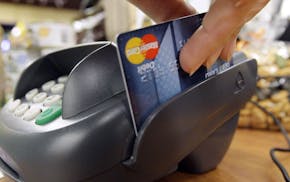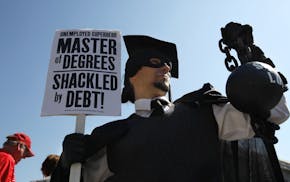At the Borders store in Roseville on Thursday, employees of the nation's second-largest bookstore chain were busily organizing inventory for the going-out-of-business sale scheduled to begin the following day.
Five miles away, I expected to encounter a much more festive atmosphere at Micawber's, an independently owned St. Paul bookstore that has lasted an improbable 39 years. Maybe something along the lines of the party scene at the end of "Star Wars: Return of the Jedi," when the rebels and Ewoks celebrate the destruction of the Death Star.
No such luck.
"I take no joy in the fact that something like 11,000 people will lose their jobs," said Hans Weyandt, one of Micawber's co-owners.
OK, that is bad. Borders' bankruptcy is also a tough break for Borders' unsecured creditors, including publishers such as Penguin U.S.A., which is owed $45 million. And it's a sad occasion for the residents of some cities who are about to lose the only bookstore in town.
Still, I was hoping for just a wee bit more schadenfreude from independent booksellers. After more than a decade's worth of stories about chain bookstores surrounding and flattening "beloved" independent booksellers, we finally had the equivalent of what we in the newspaper business call a man-bites-dog story:
Borders goes bankrupt and begins closing the remaining 400 of its 700-plus stores.
Barnes & Noble opens only nine stores during the past two years while closing 34 and, after $215 million in operating losses over the past 15 months, finds itself a takeover target.
Meanwhile, membership in the American Booksellers Association, the trade group that represents independent booksellers, is up 7 percent from a year ago, to 1,825 bookstores. ABA spokeswoman Meg Smith cautions that its member roll is an imprecise proxy of the number of independent bookstores. Still, her group hears more stories these days about independent bookstores opening than closing, and the siege mentality that gripped the industry for much of the past decade has lifted enough for the ABA to declare itself "cautiously optimistic" about the future of independent bookstores.
Weyandt and his partner, Tom Bielenberg, share that feeling, and that's saying a lot. They both worked at one failed independent bookstore, St. Paul's Ruminator Books, before joining forces to buy Micawber's in 2003. As tough as the book industry was at the time, things got even more so with the arrival of a recession and the advent of e-books.
"People ask what our business plan was, but we didn't really have one," Weyandt says. "We just knew that we couldn't try to copy the superstores, or try to be all things to everyone."
Micawber's occupies a 1,700-square-foot storefront in the center of the St. Anthony Park neighborhood. That's about one-fourteenth the size of the Borders store in Roseville. You won't find computer books or a coffee shop, other than the one across the street. There's no online store, either, and while some independent booksellers now offer e-books through Google, Weyandt won't even consider doing so until publishers make all their books available on the platforms.
What you will find at Micawber's are four employees, including the two owners, whose knowledge of and love for books seems to have found an appreciative and loyal audience. Indeed, Weyandt thinks he's detected a growing understanding on the part of consumers for what stores like his offer, vs. what they lack.
Alas, Borders' demise had more to do with management missteps in the face of rapidly evolving industry dynamics than any modest resurgence among independent booksellers. The Michigan-based chain had expanded at a pell-mell pace, setting a goal in 1997 of growing from 203 to 1,000 stores. It was late launching an online store, and then in 2001 outsourced its e-commerce operations to Amazon.com, thus ensuring that customers saw firsthand how much better its chief rival performed those functions.
Amazon's introduction of the Kindle in 2007 also helped usher in the e-book era, providing consumers with yet another reason to avoid trekking out to the mall to visit a generic book superstore. Amazon now sells more digital books than paperbacks, but for most publishers the growth in digital book sales has not matched the 25 percent decline in the sales of print books.
It's no small irony that Amazon, with its larger inventory, lower prices, and strategic advantages (no sales tax, no rent on hundreds off mall-based stores), has given Borders and Barnes & Noble a taste of the foreboding sense of irrelevance or mortality that independent bookstores experienced at the hands of the big chains.
Still, tough times for their biggest rivals have left some earnest indie booksellers feeling awfully conflicted. One posed this question on a blog hosted by Publisher's Weekly: What's the best way to reach out to Borders customers, she wondered, "without seeming graceless or unworthily triumphant?"
Celebrate your victories while you can, lady.
ericw@startribune.com • 612-673-1736

Wieffering: Time to get over debit card fees
For Thrivent and others, warnings were there

With billions in sales, some co-ops are big business

